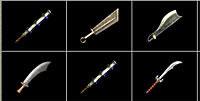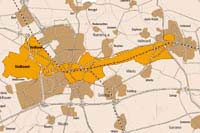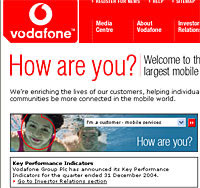 Video Networks, providers of the HomeChoice entertainment and communications service, has announced the addition of a brand new R.E.M. video-on-demand (VoD) channel to its platform.
Video Networks, providers of the HomeChoice entertainment and communications service, has announced the addition of a brand new R.E.M. video-on-demand (VoD) channel to its platform.
HomeChoice customers keen to keep on losing their religion will gain exclusive access to the channel – which has been entirely designed and built in-house – from 31st March 2005.
Earlier this year also saw the re-release of nine of R.E.M.’s most successful albums including Green, Out of Time and Automatic for the People. The launch of the R.E.M. channel ties in with the band’s UK tour.
The V:MX R.E.M. channel is being trumpeted as the first artist specific video-on-demand package in the world and will sit within HomeChoice’s suite of V:MX music channels, which feature a library of over 3,000 music videos.
The R.E.M. channel will offer a R.E.M. videography (a what?!), featuring the nine re-released R.E.M. albums.
Sofa reclining HomeChoice customers will be able to access music videos – and associated live and documentary footage – by selecting the appropriate album cover using their remote control.
The functionality of the HomeChoice service will let customers create their own R.E.M. play list from the music videos on the channel and optionally purchase downloadable tracks by SMS.
 While useful, this isn’t quite as slick as it sounds: if a viewer hears a track they want to buy, they have to click on the onscreen information button which will provide a number to text. A code is then sent back to them which they can enter when they log onto the Internet to download the music track. When we spoke to HomeChoice, they told us they were working on a more integrated way of getting pay-for content to their customers.
While useful, this isn’t quite as slick as it sounds: if a viewer hears a track they want to buy, they have to click on the onscreen information button which will provide a number to text. A code is then sent back to them which they can enter when they log onto the Internet to download the music track. When we spoke to HomeChoice, they told us they were working on a more integrated way of getting pay-for content to their customers.
Naturally, there’s the usual ring tone guff provided for those who like to display their ‘individuality’ with irritating phone noises, with the channel offering 10 R.E.M. true tones of their most popular tracks, purchasable via SMS for £3 (US$5.60 /€4.40) each.
The R.E.M. channel will also include four competitions throughout the life of the channel, with prizes including an MP3 player pre-loaded with R.E.M. tracks, a pair of VIP tickets to R.E.M.’s concert in Hyde Park in July plus several R.E.M. goody bags.
The deal is what ghastly corporate types would call a “synergetic win win situation”, with Video Networks telling us that “no money has changed hands as both parties have brought certain elements to the channel and will then be sharing the revenue from the downloads and ring tones.” This would make sense, Warners/R.E.M. are providing a lot of content, and HomeChoice/Video Networks are providing a lot of design, programming and, of course, bandwidth. Video Networks have 34 people working in their in-house design studio and within the TV product team.
 Roger Lynch, Chairman and Chief Executive, Video Networks Ltd said: “The addition of this on-demand channel is not only a true coup for R.E.M. fans but also ensures Video Networks continues to offer the most innovative music content on TV in the world today.”
Roger Lynch, Chairman and Chief Executive, Video Networks Ltd said: “The addition of this on-demand channel is not only a true coup for R.E.M. fans but also ensures Video Networks continues to offer the most innovative music content on TV in the world today.”
The R.E.M. music channel will be automatically available to all shiny, happy customers who currently subscribe to the HomeChoice music package.
The negotiations for the deal with Warner Music have been underway since the beginning of 2005, brokered by a Video Networks BizDev person, who joined them from the music business. The service launches on 31st March 2005 and is available for a total of 16 weeks.
 The London Underground is to show digital advertising on its escalators for the first time, as part of a trial being handled by Viacom Outdoor.
The London Underground is to show digital advertising on its escalators for the first time, as part of a trial being handled by Viacom Outdoor. The trial is due to start within months, and if successful will be rolled out at other locations across the network.
The trial is due to start within months, and if successful will be rolled out at other locations across the network. In a shocking example of virtual life crashing into real life, a Shanghai online game player stabbed his gaming pal in the chest multiple times after he learned that he had stolen approximately US$870 (£462/€671) from the sale of a powerful “dragon sabre”, jointly owned by both players.
In a shocking example of virtual life crashing into real life, a Shanghai online game player stabbed his gaming pal in the chest multiple times after he learned that he had stolen approximately US$870 (£462/€671) from the sale of a powerful “dragon sabre”, jointly owned by both players. Still fuming, Chengwei popped around to have a word with Caoyuan who didn’t convince with his promises to pay him for the sword.
Still fuming, Chengwei popped around to have a word with Caoyuan who didn’t convince with his promises to pay him for the sword. However, online game companies in Shanghai – the city with the most players – are planning to set up a dispute system where aggrieved players can find recourse.
However, online game companies in Shanghai – the city with the most players – are planning to set up a dispute system where aggrieved players can find recourse. Last week, deputy Director-General Mr Broesterhuizen of the Dutch ministry of Economic Affairs officially opened the Netherland’s largest Fiber-to-the-Home (FttH) network in Nuenen, a village in the south of The Netherlands.
Last week, deputy Director-General Mr Broesterhuizen of the Dutch ministry of Economic Affairs officially opened the Netherland’s largest Fiber-to-the-Home (FttH) network in Nuenen, a village in the south of The Netherlands. By summer 2005, approximately 16,000 FttH connections will be up and running in the Kenniswijk area, with over “100 innovative services” being developed, of which 50 are already available.
By summer 2005, approximately 16,000 FttH connections will be up and running in the Kenniswijk area, with over “100 innovative services” being developed, of which 50 are already available. As of early May, Dutch Vodafone customers will be able to say ‘nr!’ to saucy adult content offered via Vodafone live! from their mobile phone.
As of early May, Dutch Vodafone customers will be able to say ‘nr!’ to saucy adult content offered via Vodafone live! from their mobile phone. With hand-rubbing porn-shifters keenly eying up a growing – and lucrative – mobile multimedia market, it makes sense for telcos to be able to reassure parents that young Timmy’s new handset isn’t going to become a mobile gateway into the portals of smut.
With hand-rubbing porn-shifters keenly eying up a growing – and lucrative – mobile multimedia market, it makes sense for telcos to be able to reassure parents that young Timmy’s new handset isn’t going to become a mobile gateway into the portals of smut. History will be made in a small corner of Wales today when the residents of two Carmarthenshire villages – situated on either side of the River Tywi – switch to digital-only TV.
History will be made in a small corner of Wales today when the residents of two Carmarthenshire villages – situated on either side of the River Tywi – switch to digital-only TV. To help smooth the transition, a helpline was set up for residents’ teething problems, with one-to-one support made available to the elderly.
To help smooth the transition, a helpline was set up for residents’ teething problems, with one-to-one support made available to the elderly. There are concerns, however, that these fancy-pants new digi-boxes could be a problem for the elderly and those on poor incomes. The government is discussing with charities about how to protect the vulnerable while promising not to authorise a complete switchover until support measures are in place.
There are concerns, however, that these fancy-pants new digi-boxes could be a problem for the elderly and those on poor incomes. The government is discussing with charities about how to protect the vulnerable while promising not to authorise a complete switchover until support measures are in place. Research carried out on by Infosecurity Europe has revealed that 92% of people were willing to freely dish out all the personal information needed to steal their identity in exchange for the chance to win a theatre ticket.
Research carried out on by Infosecurity Europe has revealed that 92% of people were willing to freely dish out all the personal information needed to steal their identity in exchange for the chance to win a theatre ticket. When they were told that it was a combination of their pets name and mothers maiden name, they were asked what they thought their stage name would be. Like a bunch of chumps, ninety four percent (94%) of respondees then blabbered out their mother’s maiden name and pet’s name.
When they were told that it was a combination of their pets name and mothers maiden name, they were asked what they thought their stage name would be. Like a bunch of chumps, ninety four percent (94%) of respondees then blabbered out their mother’s maiden name and pet’s name. Incredibly, the researchers did not give any verification of their identity, offering only a trusty clipboard and the offer of the chance to win a voucher for theatre tickets.
Incredibly, the researchers did not give any verification of their identity, offering only a trusty clipboard and the offer of the chance to win a voucher for theatre tickets. A British company has unveiled its cunning plan to roll out high-speed wireless networks and location-based services using street lampposts.
A British company has unveiled its cunning plan to roll out high-speed wireless networks and location-based services using street lampposts. Shrier believes that revenue could be generated by persuading companies to store their information on lampposts, paying Last Mile whenever someone accesses data using the MagicBook.
Shrier believes that revenue could be generated by persuading companies to store their information on lampposts, paying Last Mile whenever someone accesses data using the MagicBook. Microsoft has agreed – with all the enthusiasm of a child being made to eat spinach – to adopt all the “main changes” requested by the European Commission to its new version of Windows without Media player components.
Microsoft has agreed – with all the enthusiasm of a child being made to eat spinach – to adopt all the “main changes” requested by the European Commission to its new version of Windows without Media player components. Horacio Gutierrez, a lawyer for Microsoft, was clearly not too happy, telling Reuters that the company has “some misgivings about the chosen name, as we fear it may cause confusion for consumers about the product, but we will adopt the Commission’s name in order to move forward and accelerate the pace of the implementation process.”
Horacio Gutierrez, a lawyer for Microsoft, was clearly not too happy, telling Reuters that the company has “some misgivings about the chosen name, as we fear it may cause confusion for consumers about the product, but we will adopt the Commission’s name in order to move forward and accelerate the pace of the implementation process.” And there’s more! Microsoft are also in disagreement with the EU over plans to appoint a trustee to monitor Microsoft’s compliance (or the complete lack of) – if the company fail to comply with the Commission’s decisions, they could face a daily slapdown of up to US$5 million – the equivalent of a cup of coffee in Bill Gates’ world.
And there’s more! Microsoft are also in disagreement with the EU over plans to appoint a trustee to monitor Microsoft’s compliance (or the complete lack of) – if the company fail to comply with the Commission’s decisions, they could face a daily slapdown of up to US$5 million – the equivalent of a cup of coffee in Bill Gates’ world. New figures released by the BPI (British Phonographic Industry) confirm that UK music fans are the numero uno, mad-for-it music buyers in the world, with each tune-loving Brit buying on average 3.2 CDs per person per year.
New figures released by the BPI (British Phonographic Industry) confirm that UK music fans are the numero uno, mad-for-it music buyers in the world, with each tune-loving Brit buying on average 3.2 CDs per person per year. It also raises questions about recent BPI lawsuits against alleged P2P file-swappers and the promotional role the networks may be playing.
It also raises questions about recent BPI lawsuits against alleged P2P file-swappers and the promotional role the networks may be playing. With album bundles and sales of digital EPs also doing good business in the UK, the Official UK Charts Company estimate that the total UK market for downloads topped 9 million units in 2004.
With album bundles and sales of digital EPs also doing good business in the UK, the Official UK Charts Company estimate that the total UK market for downloads topped 9 million units in 2004.